COVID-19 relief is costing Nova Scotia nearly $580M: auditor general
Expected surplus of $55 million is now forecasted to be a deficit of $853 million

caption
COVID sign at a storefront.Nova Scotia spent $120 million in the last fiscal year on COVID-19 relief measures and expects to spend almost $460 million this year, the acting auditor general said Tuesday.
The province introduced a number of special financing relief measures in 2019-20, Terry Spicer, acting auditor general, stated in a video release.
“Those measures include government and student loan deferrals, a loan program for municipalities, cash advances to universities and infrastructure stimulus funding to kickstart the economy,” Spicer said in the video.
He said the government projected an economic growth of 2.4 per cent before COVID-19 but a decline by 5.5 per cent by the end of July 2020.
“That’s almost a $1 billion swing,” Spicer said.
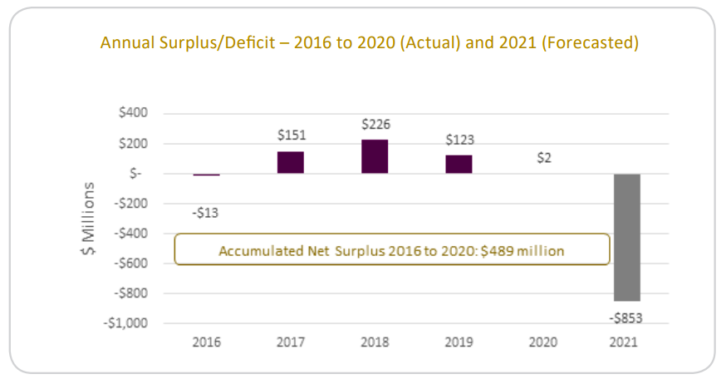
caption
Annual Surplus/Deficit – 2016 to 2020 and 2021 (Projected)An expected surplus of $55 million is now forecasted to be a deficit of $853 million this fiscal year, according to his December 2020 report. The province is forecasting a decrease of $599.2 million in total provincial revenue for 2020-21 from original estimates.
Spicer added in his release that the province’s health system is experiencing significant operational costs. The total projected COVID-19 related costs on the health system for this year, according to the report, is $331 million. There was more spending on communications equipment and technology to support ongoing health care.
Premier Stephen McNeil said Tuesday the government will have more to say about spending on health in the coming weeks.
“There’s a cost associated with shutting down,” he said during the COVID-19 media briefing.
The auditor general also detailed the province’s announcement of an infrastructure grant of $228 million to stimulate the economy. The intent was to create jobs, improve infrastructure and get the economy moving again.
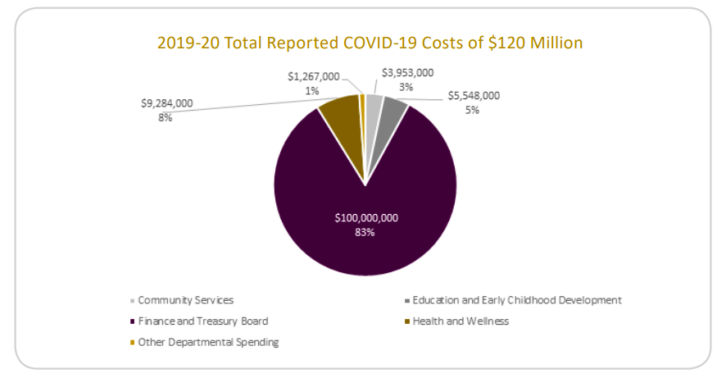
caption
2019-20 Total Reported COVID-19 Costs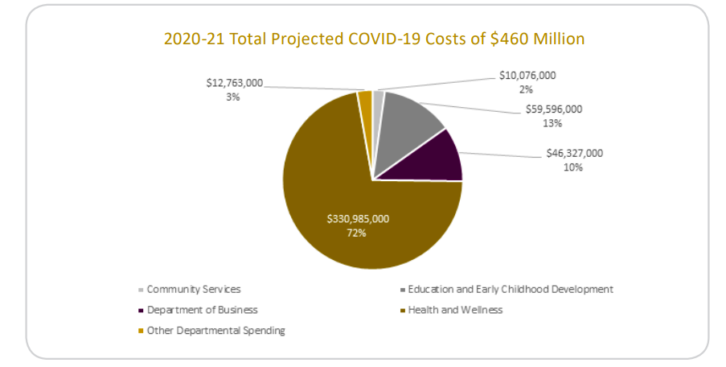
caption
2020-21 Total Forecasted COVID-19 CostsOther government departments also shouldered financial impacts because of COVID-19, the report stated. For 2020-21, this includes:
- $60 million projected in the Department of Education and Early Childhood Development,
- $46 million in the Department of Business,
- $10 million in the Department of Community Services.
The impacts of COVID-19 will be felt beyond the 2020-21 fiscal period, the report summarized.
Economic recovery plan?
The NDP is renewing its call for a task force to develop a plan for how Nova Scotia handles the economic recovery from COVID-19.
“Everything from child care, to sick days, to minimum wage needs to be considered when we think about the economic recovery that’s needed,” NDP Leader Gary Burrill said in a news release.
McNeil said Nova Scotia is the only province to ensure that early childhood educators were paid through the entire pandemic wave.
Provinces including Alberta and British Columbia have released economic recovery plans that outline strategies and initiatives to help the economy rebound. Nova Scotia has not yet released its own long-term economic recovery plan.
McNeil said the auditor general reviews the provincial spending in “hindsight.”
“I’m grateful for men and women who’ve been hiring and rehiring Nova Scotians back into our work force … who continued to thrive during this period of time keeping jobs sites safe,” he said.
The report is thorough, PC Leader Tim Houston said on his Facebook page, but “it’s still not clear how, and if, the government has been spending $228 million of federal COVID-19 relief money.”
Cybersecurity and fraud risk management
The auditor general’s report also followed up on previous issues, including cybersecurity and fraud risk management.
According to the report, risks to provincial cybersecurity have increased during COVID-19, with many provincial employees working from home and accessing the network from remote locations.
Houston said the privacy of Nova Scotians is at risk because the government doesn’t provide cybersecurity training to its IT users.
“The government’s failure to act on enhancing cybersecurity is concerning,” Houston wrote. “As governments around the world find themselves increasingly at risk of cyber attacks, Nova Scotia has shown that it doesn’t place a high importance on keeping our health and other records safe from improper access.”
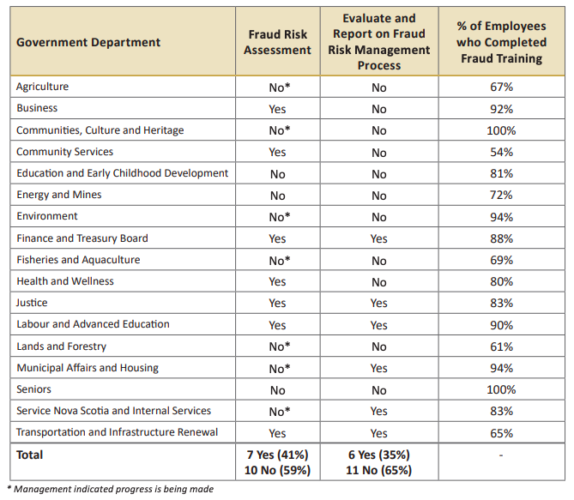
caption
Management’s Responses from Government Departments Regarding Certain Aspects of a Fraud Risk Management Program as of March 31, 2020The report stated that many provincial departments have not completed fraud risk assessments and “the government is not acting fast enough” to ensure fraud risks are managed well within the public sectors.
‘Control weaknesses’
In his report, Spicer stated that Nova Scotia’s reported financial statements met Canadian public sector accounting standards for the 20th time in a row, despite COVID-19. However, he said the government should work on “control weaknesses” identified in the current and prior years that have not been sufficiently addressed, including Housing Nova Scotia, IWK Health Centre, and NS Health Authority.
Weaknesses were also found in the Department of Service Nova Scotia and Internal Services, and the Department of Lands and Forestry.
Service Nova Scotia and Internal Services had eight significant control weaknesses related to purchases and procurement carried forward from prior years. Lands and Forestry did not complete sufficient investigations of abandoned mine sites that have potential areas of contamination, the report stated.
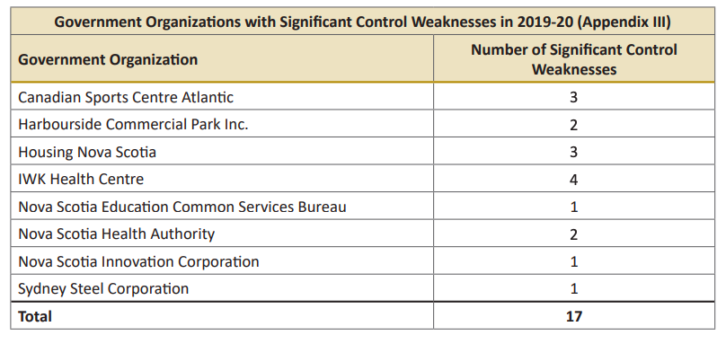
caption
Government organizations with significant control weaknesses in 2019-20“There is a risk that potential contamination is not identified or managed, resulting in possible unaddressed human health or ecological concerns,” the report stated.
“Although accounting standards have been met, underlying control weakness exist, and they increase the risk of unreliable financial reporting and misuse of assets in the future,” Spicer said in his video.

